Reflective Report: Organizational Behavior and Personality Assessment
VerifiedAdded on 2022/10/04
|7
|1510
|18
Report
AI Summary
This reflective report examines the student's personality assessment results, focusing on traits such as introversion, neuroticism, agreeableness, conscientiousness, and openness to experience. The report analyzes how these traits align with organizational behavior theories, particularly the autocratic model, and how they can contribute to or challenge work group dynamics. It identifies the student's strengths, such as hard work and honesty, and weaknesses, such as emotional reactivity. The report proposes two strategies to maximize strengths in the organizational context: discreet communication and setting reasonable personal targets. The report references several academic sources to support its analysis.
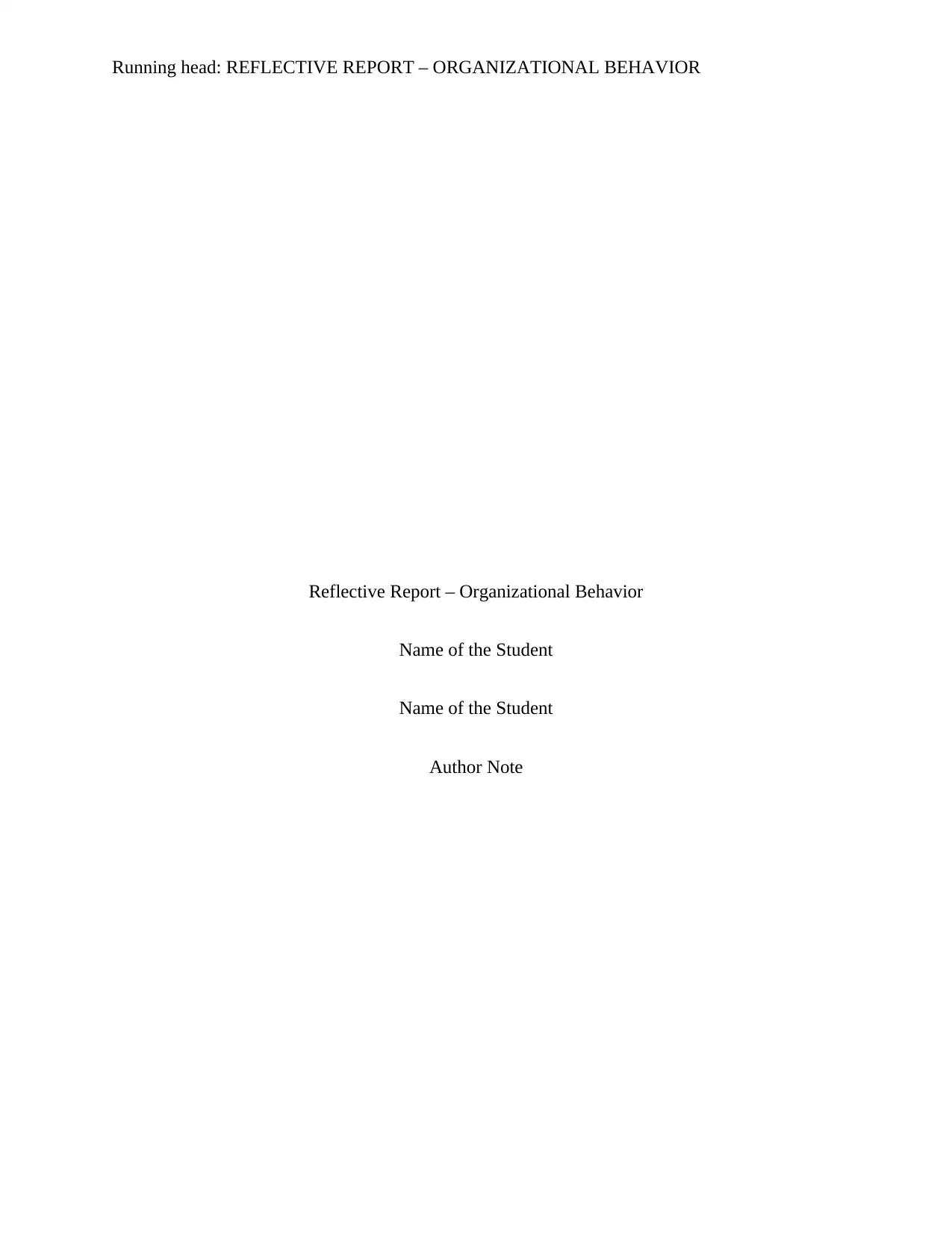
Running head: REFLECTIVE REPORT – ORGANIZATIONAL BEHAVIOR
Reflective Report – Organizational Behavior
Name of the Student
Name of the Student
Author Note
Reflective Report – Organizational Behavior
Name of the Student
Name of the Student
Author Note
Paraphrase This Document
Need a fresh take? Get an instant paraphrase of this document with our AI Paraphraser
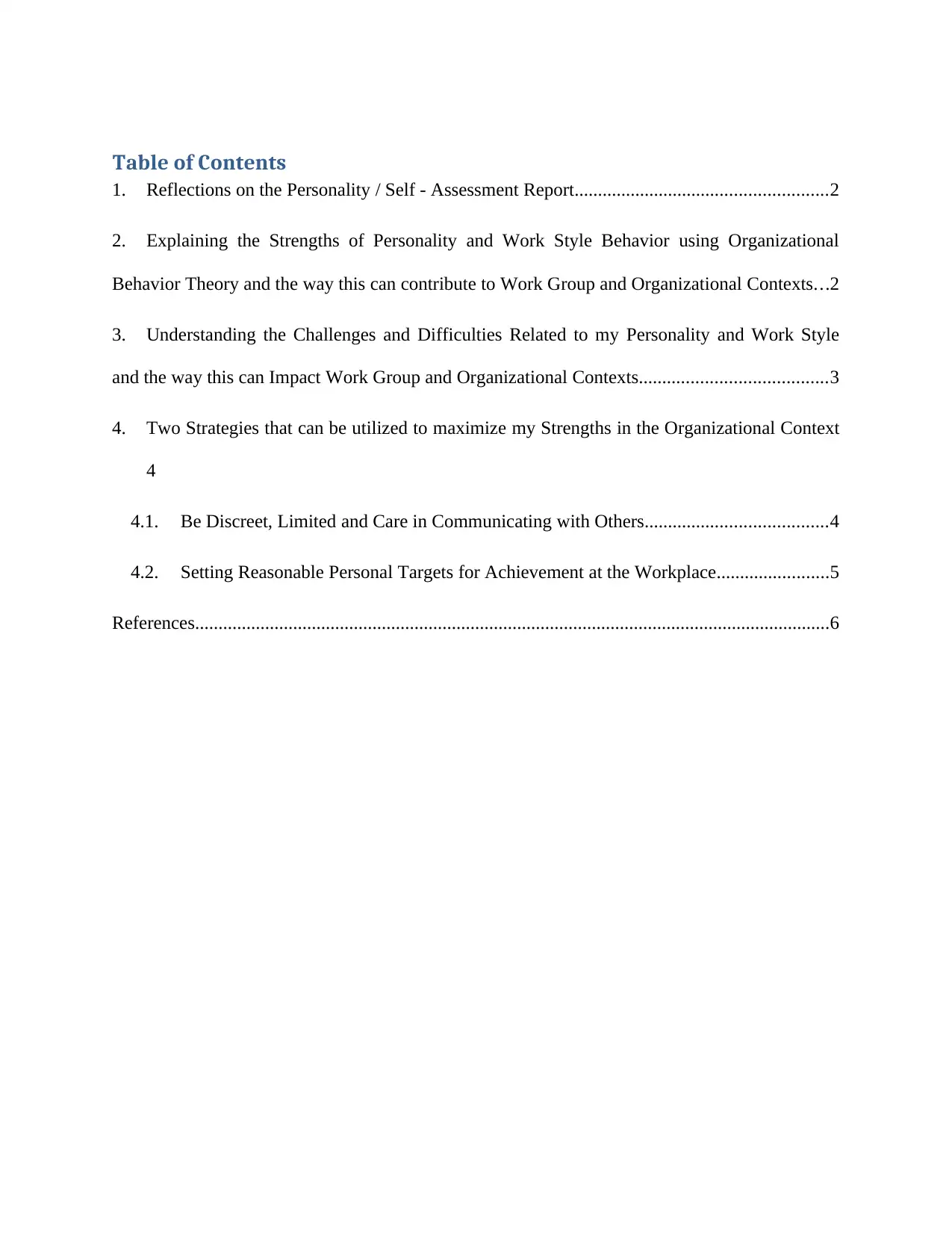
Table of Contents
1. Reflections on the Personality / Self - Assessment Report......................................................2
2. Explaining the Strengths of Personality and Work Style Behavior using Organizational
Behavior Theory and the way this can contribute to Work Group and Organizational Contexts...2
3. Understanding the Challenges and Difficulties Related to my Personality and Work Style
and the way this can Impact Work Group and Organizational Contexts........................................3
4. Two Strategies that can be utilized to maximize my Strengths in the Organizational Context
4
4.1. Be Discreet, Limited and Care in Communicating with Others.......................................4
4.2. Setting Reasonable Personal Targets for Achievement at the Workplace........................5
References........................................................................................................................................6
1. Reflections on the Personality / Self - Assessment Report......................................................2
2. Explaining the Strengths of Personality and Work Style Behavior using Organizational
Behavior Theory and the way this can contribute to Work Group and Organizational Contexts...2
3. Understanding the Challenges and Difficulties Related to my Personality and Work Style
and the way this can Impact Work Group and Organizational Contexts........................................3
4. Two Strategies that can be utilized to maximize my Strengths in the Organizational Context
4
4.1. Be Discreet, Limited and Care in Communicating with Others.......................................4
4.2. Setting Reasonable Personal Targets for Achievement at the Workplace........................5
References........................................................................................................................................6
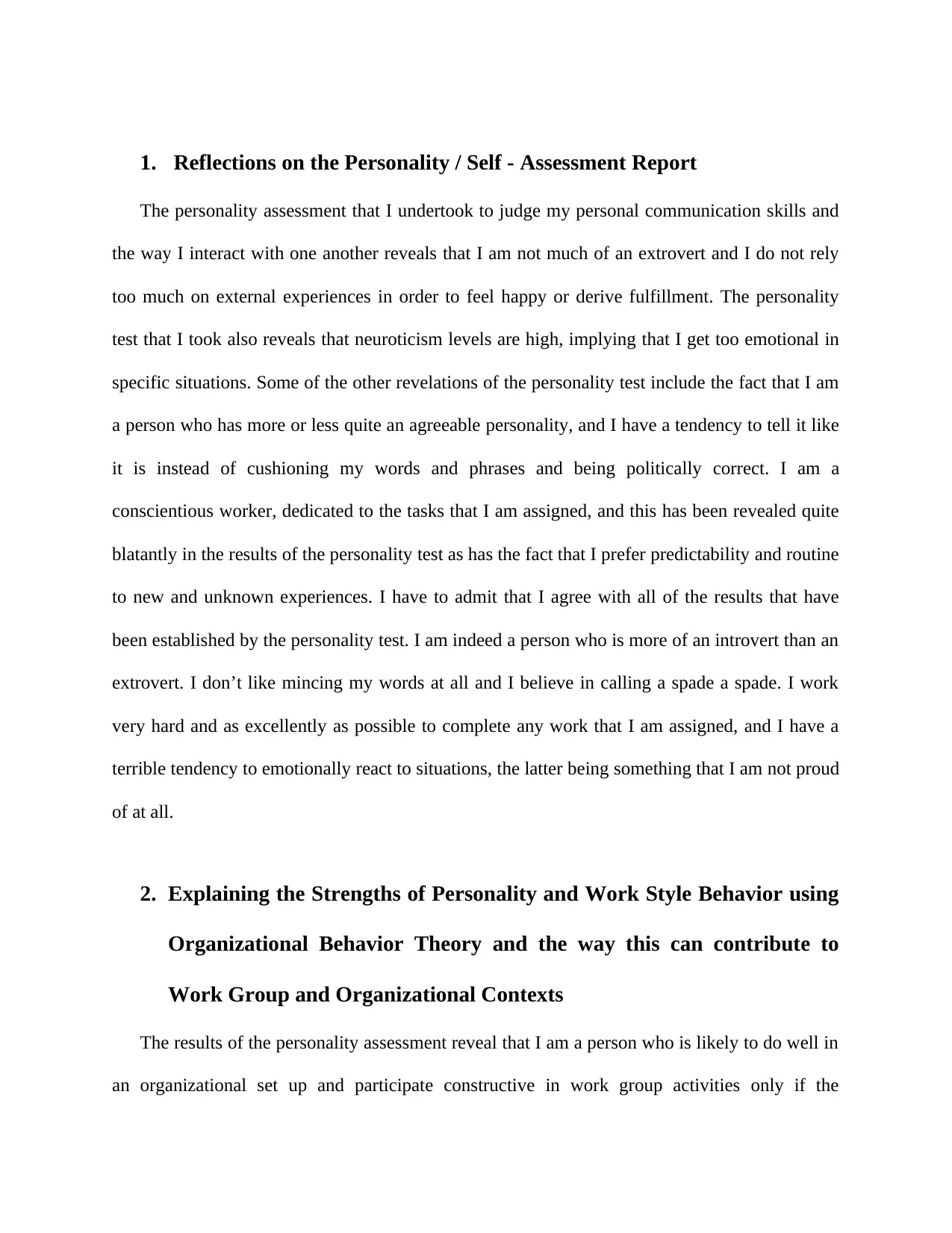
1. Reflections on the Personality / Self - Assessment Report
The personality assessment that I undertook to judge my personal communication skills and
the way I interact with one another reveals that I am not much of an extrovert and I do not rely
too much on external experiences in order to feel happy or derive fulfillment. The personality
test that I took also reveals that neuroticism levels are high, implying that I get too emotional in
specific situations. Some of the other revelations of the personality test include the fact that I am
a person who has more or less quite an agreeable personality, and I have a tendency to tell it like
it is instead of cushioning my words and phrases and being politically correct. I am a
conscientious worker, dedicated to the tasks that I am assigned, and this has been revealed quite
blatantly in the results of the personality test as has the fact that I prefer predictability and routine
to new and unknown experiences. I have to admit that I agree with all of the results that have
been established by the personality test. I am indeed a person who is more of an introvert than an
extrovert. I don’t like mincing my words at all and I believe in calling a spade a spade. I work
very hard and as excellently as possible to complete any work that I am assigned, and I have a
terrible tendency to emotionally react to situations, the latter being something that I am not proud
of at all.
2. Explaining the Strengths of Personality and Work Style Behavior using
Organizational Behavior Theory and the way this can contribute to
Work Group and Organizational Contexts
The results of the personality assessment reveal that I am a person who is likely to do well in
an organizational set up and participate constructive in work group activities only if the
The personality assessment that I undertook to judge my personal communication skills and
the way I interact with one another reveals that I am not much of an extrovert and I do not rely
too much on external experiences in order to feel happy or derive fulfillment. The personality
test that I took also reveals that neuroticism levels are high, implying that I get too emotional in
specific situations. Some of the other revelations of the personality test include the fact that I am
a person who has more or less quite an agreeable personality, and I have a tendency to tell it like
it is instead of cushioning my words and phrases and being politically correct. I am a
conscientious worker, dedicated to the tasks that I am assigned, and this has been revealed quite
blatantly in the results of the personality test as has the fact that I prefer predictability and routine
to new and unknown experiences. I have to admit that I agree with all of the results that have
been established by the personality test. I am indeed a person who is more of an introvert than an
extrovert. I don’t like mincing my words at all and I believe in calling a spade a spade. I work
very hard and as excellently as possible to complete any work that I am assigned, and I have a
terrible tendency to emotionally react to situations, the latter being something that I am not proud
of at all.
2. Explaining the Strengths of Personality and Work Style Behavior using
Organizational Behavior Theory and the way this can contribute to
Work Group and Organizational Contexts
The results of the personality assessment reveal that I am a person who is likely to do well in
an organizational set up and participate constructive in work group activities only if the
⊘ This is a preview!⊘
Do you want full access?
Subscribe today to unlock all pages.

Trusted by 1+ million students worldwide
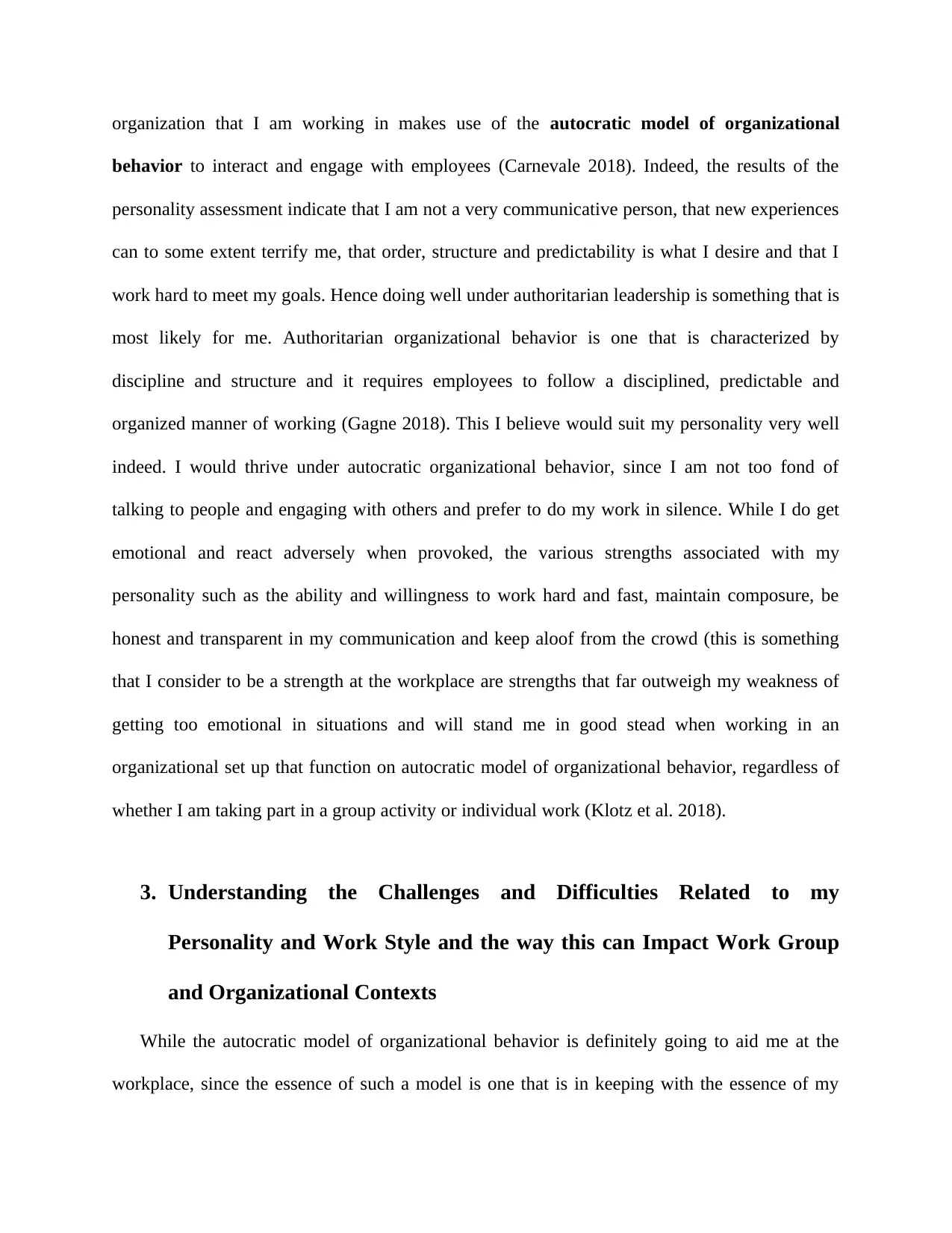
organization that I am working in makes use of the autocratic model of organizational
behavior to interact and engage with employees (Carnevale 2018). Indeed, the results of the
personality assessment indicate that I am not a very communicative person, that new experiences
can to some extent terrify me, that order, structure and predictability is what I desire and that I
work hard to meet my goals. Hence doing well under authoritarian leadership is something that is
most likely for me. Authoritarian organizational behavior is one that is characterized by
discipline and structure and it requires employees to follow a disciplined, predictable and
organized manner of working (Gagne 2018). This I believe would suit my personality very well
indeed. I would thrive under autocratic organizational behavior, since I am not too fond of
talking to people and engaging with others and prefer to do my work in silence. While I do get
emotional and react adversely when provoked, the various strengths associated with my
personality such as the ability and willingness to work hard and fast, maintain composure, be
honest and transparent in my communication and keep aloof from the crowd (this is something
that I consider to be a strength at the workplace are strengths that far outweigh my weakness of
getting too emotional in situations and will stand me in good stead when working in an
organizational set up that function on autocratic model of organizational behavior, regardless of
whether I am taking part in a group activity or individual work (Klotz et al. 2018).
3. Understanding the Challenges and Difficulties Related to my
Personality and Work Style and the way this can Impact Work Group
and Organizational Contexts
While the autocratic model of organizational behavior is definitely going to aid me at the
workplace, since the essence of such a model is one that is in keeping with the essence of my
behavior to interact and engage with employees (Carnevale 2018). Indeed, the results of the
personality assessment indicate that I am not a very communicative person, that new experiences
can to some extent terrify me, that order, structure and predictability is what I desire and that I
work hard to meet my goals. Hence doing well under authoritarian leadership is something that is
most likely for me. Authoritarian organizational behavior is one that is characterized by
discipline and structure and it requires employees to follow a disciplined, predictable and
organized manner of working (Gagne 2018). This I believe would suit my personality very well
indeed. I would thrive under autocratic organizational behavior, since I am not too fond of
talking to people and engaging with others and prefer to do my work in silence. While I do get
emotional and react adversely when provoked, the various strengths associated with my
personality such as the ability and willingness to work hard and fast, maintain composure, be
honest and transparent in my communication and keep aloof from the crowd (this is something
that I consider to be a strength at the workplace are strengths that far outweigh my weakness of
getting too emotional in situations and will stand me in good stead when working in an
organizational set up that function on autocratic model of organizational behavior, regardless of
whether I am taking part in a group activity or individual work (Klotz et al. 2018).
3. Understanding the Challenges and Difficulties Related to my
Personality and Work Style and the way this can Impact Work Group
and Organizational Contexts
While the autocratic model of organizational behavior is definitely going to aid me at the
workplace, since the essence of such a model is one that is in keeping with the essence of my
Paraphrase This Document
Need a fresh take? Get an instant paraphrase of this document with our AI Paraphraser
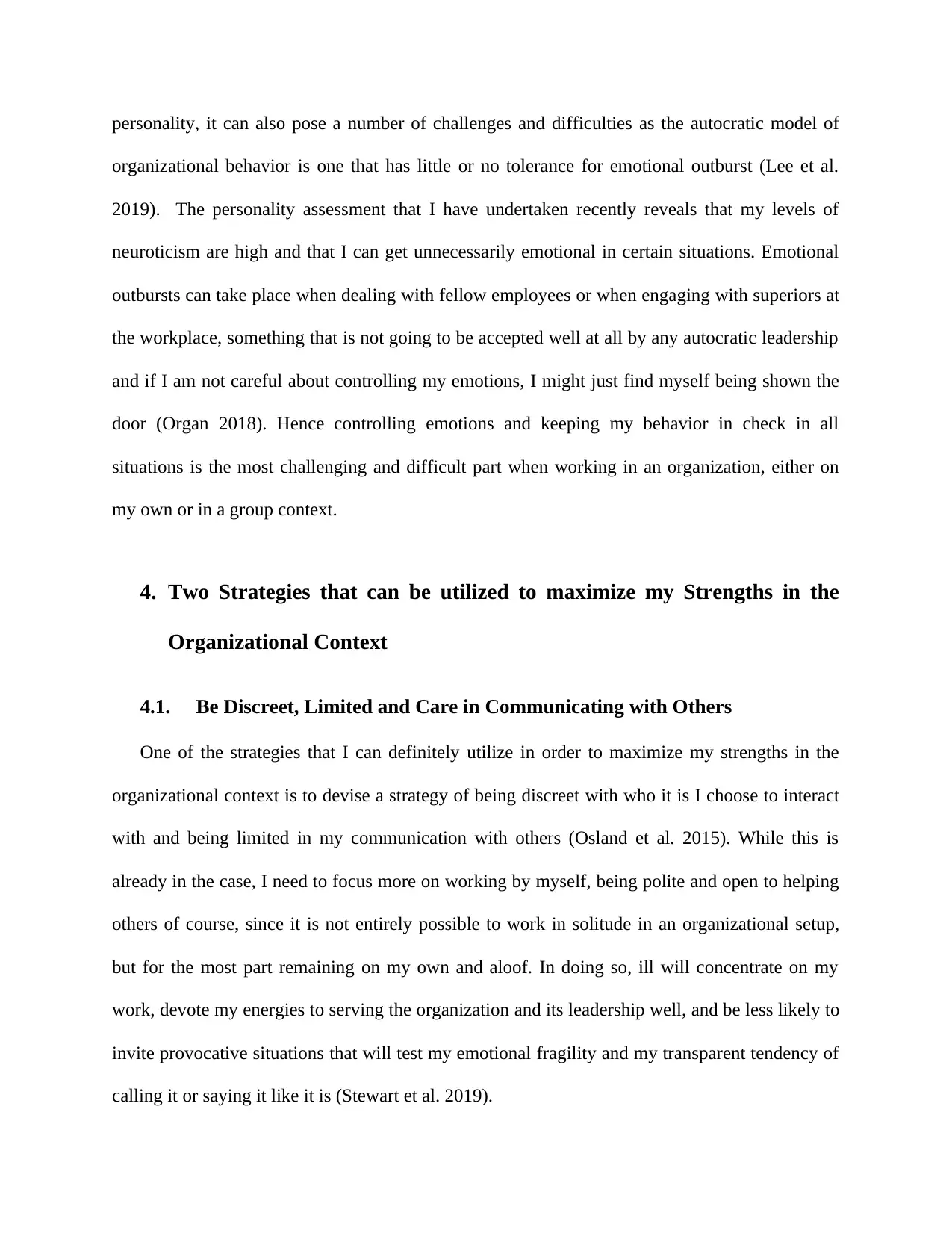
personality, it can also pose a number of challenges and difficulties as the autocratic model of
organizational behavior is one that has little or no tolerance for emotional outburst (Lee et al.
2019). The personality assessment that I have undertaken recently reveals that my levels of
neuroticism are high and that I can get unnecessarily emotional in certain situations. Emotional
outbursts can take place when dealing with fellow employees or when engaging with superiors at
the workplace, something that is not going to be accepted well at all by any autocratic leadership
and if I am not careful about controlling my emotions, I might just find myself being shown the
door (Organ 2018). Hence controlling emotions and keeping my behavior in check in all
situations is the most challenging and difficult part when working in an organization, either on
my own or in a group context.
4. Two Strategies that can be utilized to maximize my Strengths in the
Organizational Context
4.1. Be Discreet, Limited and Care in Communicating with Others
One of the strategies that I can definitely utilize in order to maximize my strengths in the
organizational context is to devise a strategy of being discreet with who it is I choose to interact
with and being limited in my communication with others (Osland et al. 2015). While this is
already in the case, I need to focus more on working by myself, being polite and open to helping
others of course, since it is not entirely possible to work in solitude in an organizational setup,
but for the most part remaining on my own and aloof. In doing so, ill will concentrate on my
work, devote my energies to serving the organization and its leadership well, and be less likely to
invite provocative situations that will test my emotional fragility and my transparent tendency of
calling it or saying it like it is (Stewart et al. 2019).
organizational behavior is one that has little or no tolerance for emotional outburst (Lee et al.
2019). The personality assessment that I have undertaken recently reveals that my levels of
neuroticism are high and that I can get unnecessarily emotional in certain situations. Emotional
outbursts can take place when dealing with fellow employees or when engaging with superiors at
the workplace, something that is not going to be accepted well at all by any autocratic leadership
and if I am not careful about controlling my emotions, I might just find myself being shown the
door (Organ 2018). Hence controlling emotions and keeping my behavior in check in all
situations is the most challenging and difficult part when working in an organization, either on
my own or in a group context.
4. Two Strategies that can be utilized to maximize my Strengths in the
Organizational Context
4.1. Be Discreet, Limited and Care in Communicating with Others
One of the strategies that I can definitely utilize in order to maximize my strengths in the
organizational context is to devise a strategy of being discreet with who it is I choose to interact
with and being limited in my communication with others (Osland et al. 2015). While this is
already in the case, I need to focus more on working by myself, being polite and open to helping
others of course, since it is not entirely possible to work in solitude in an organizational setup,
but for the most part remaining on my own and aloof. In doing so, ill will concentrate on my
work, devote my energies to serving the organization and its leadership well, and be less likely to
invite provocative situations that will test my emotional fragility and my transparent tendency of
calling it or saying it like it is (Stewart et al. 2019).
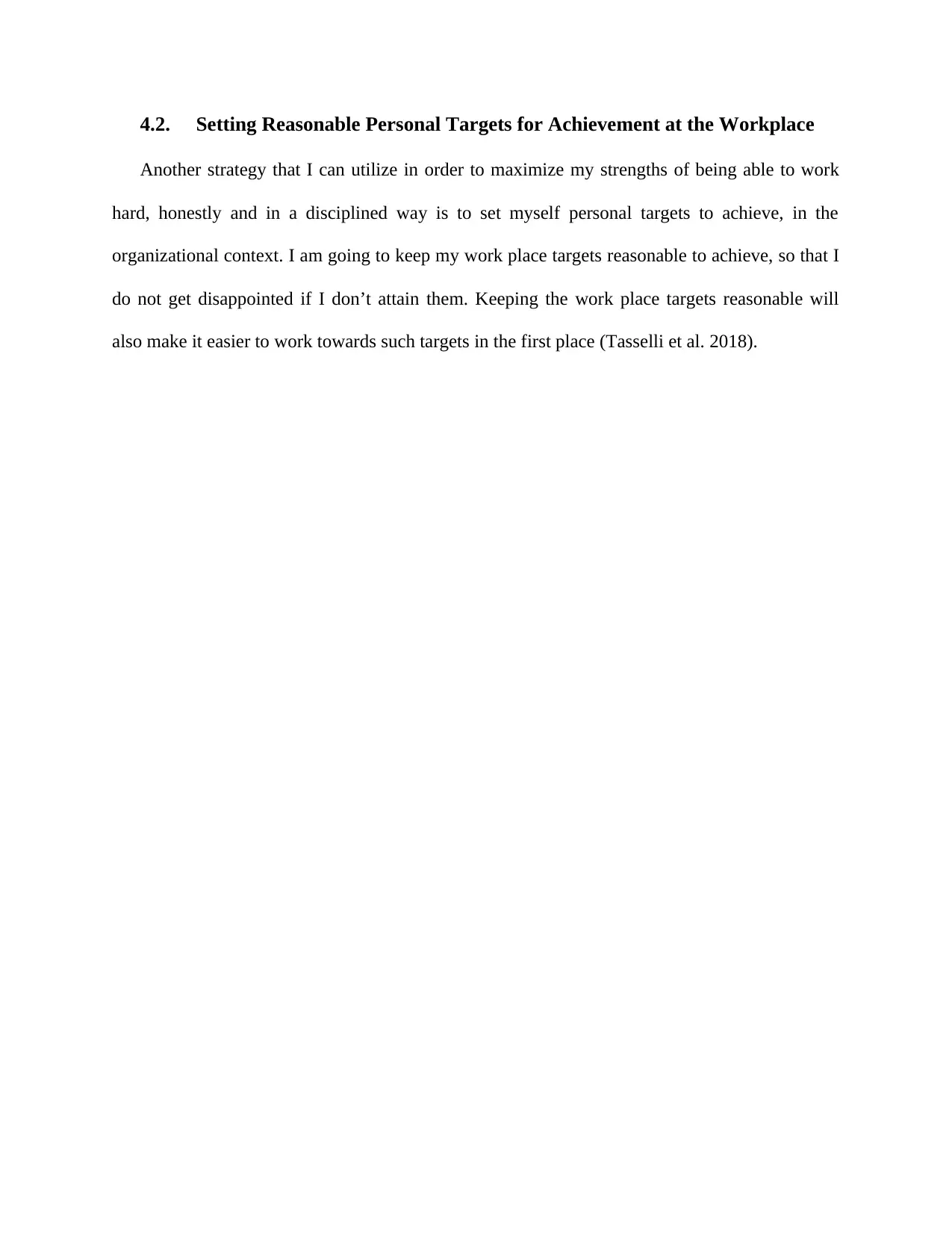
4.2. Setting Reasonable Personal Targets for Achievement at the Workplace
Another strategy that I can utilize in order to maximize my strengths of being able to work
hard, honestly and in a disciplined way is to set myself personal targets to achieve, in the
organizational context. I am going to keep my work place targets reasonable to achieve, so that I
do not get disappointed if I don’t attain them. Keeping the work place targets reasonable will
also make it easier to work towards such targets in the first place (Tasselli et al. 2018).
Another strategy that I can utilize in order to maximize my strengths of being able to work
hard, honestly and in a disciplined way is to set myself personal targets to achieve, in the
organizational context. I am going to keep my work place targets reasonable to achieve, so that I
do not get disappointed if I don’t attain them. Keeping the work place targets reasonable will
also make it easier to work towards such targets in the first place (Tasselli et al. 2018).
⊘ This is a preview!⊘
Do you want full access?
Subscribe today to unlock all pages.

Trusted by 1+ million students worldwide
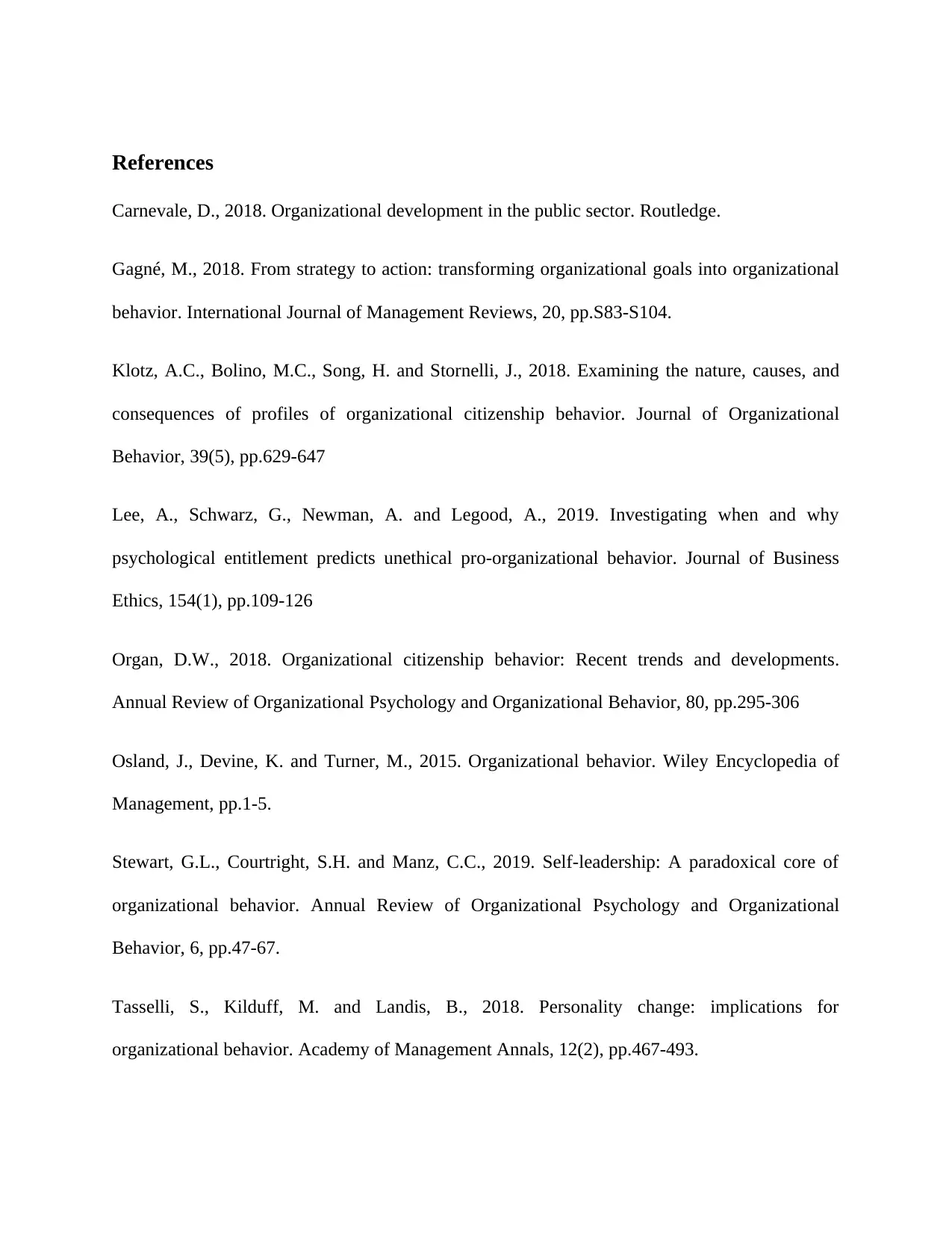
References
Carnevale, D., 2018. Organizational development in the public sector. Routledge.
Gagné, M., 2018. From strategy to action: transforming organizational goals into organizational
behavior. International Journal of Management Reviews, 20, pp.S83-S104.
Klotz, A.C., Bolino, M.C., Song, H. and Stornelli, J., 2018. Examining the nature, causes, and
consequences of profiles of organizational citizenship behavior. Journal of Organizational
Behavior, 39(5), pp.629-647
Lee, A., Schwarz, G., Newman, A. and Legood, A., 2019. Investigating when and why
psychological entitlement predicts unethical pro-organizational behavior. Journal of Business
Ethics, 154(1), pp.109-126
Organ, D.W., 2018. Organizational citizenship behavior: Recent trends and developments.
Annual Review of Organizational Psychology and Organizational Behavior, 80, pp.295-306
Osland, J., Devine, K. and Turner, M., 2015. Organizational behavior. Wiley Encyclopedia of
Management, pp.1-5.
Stewart, G.L., Courtright, S.H. and Manz, C.C., 2019. Self-leadership: A paradoxical core of
organizational behavior. Annual Review of Organizational Psychology and Organizational
Behavior, 6, pp.47-67.
Tasselli, S., Kilduff, M. and Landis, B., 2018. Personality change: implications for
organizational behavior. Academy of Management Annals, 12(2), pp.467-493.
Carnevale, D., 2018. Organizational development in the public sector. Routledge.
Gagné, M., 2018. From strategy to action: transforming organizational goals into organizational
behavior. International Journal of Management Reviews, 20, pp.S83-S104.
Klotz, A.C., Bolino, M.C., Song, H. and Stornelli, J., 2018. Examining the nature, causes, and
consequences of profiles of organizational citizenship behavior. Journal of Organizational
Behavior, 39(5), pp.629-647
Lee, A., Schwarz, G., Newman, A. and Legood, A., 2019. Investigating when and why
psychological entitlement predicts unethical pro-organizational behavior. Journal of Business
Ethics, 154(1), pp.109-126
Organ, D.W., 2018. Organizational citizenship behavior: Recent trends and developments.
Annual Review of Organizational Psychology and Organizational Behavior, 80, pp.295-306
Osland, J., Devine, K. and Turner, M., 2015. Organizational behavior. Wiley Encyclopedia of
Management, pp.1-5.
Stewart, G.L., Courtright, S.H. and Manz, C.C., 2019. Self-leadership: A paradoxical core of
organizational behavior. Annual Review of Organizational Psychology and Organizational
Behavior, 6, pp.47-67.
Tasselli, S., Kilduff, M. and Landis, B., 2018. Personality change: implications for
organizational behavior. Academy of Management Annals, 12(2), pp.467-493.
1 out of 7
Related Documents
Your All-in-One AI-Powered Toolkit for Academic Success.
+13062052269
info@desklib.com
Available 24*7 on WhatsApp / Email
![[object Object]](/_next/static/media/star-bottom.7253800d.svg)
Unlock your academic potential
Copyright © 2020–2026 A2Z Services. All Rights Reserved. Developed and managed by ZUCOL.




